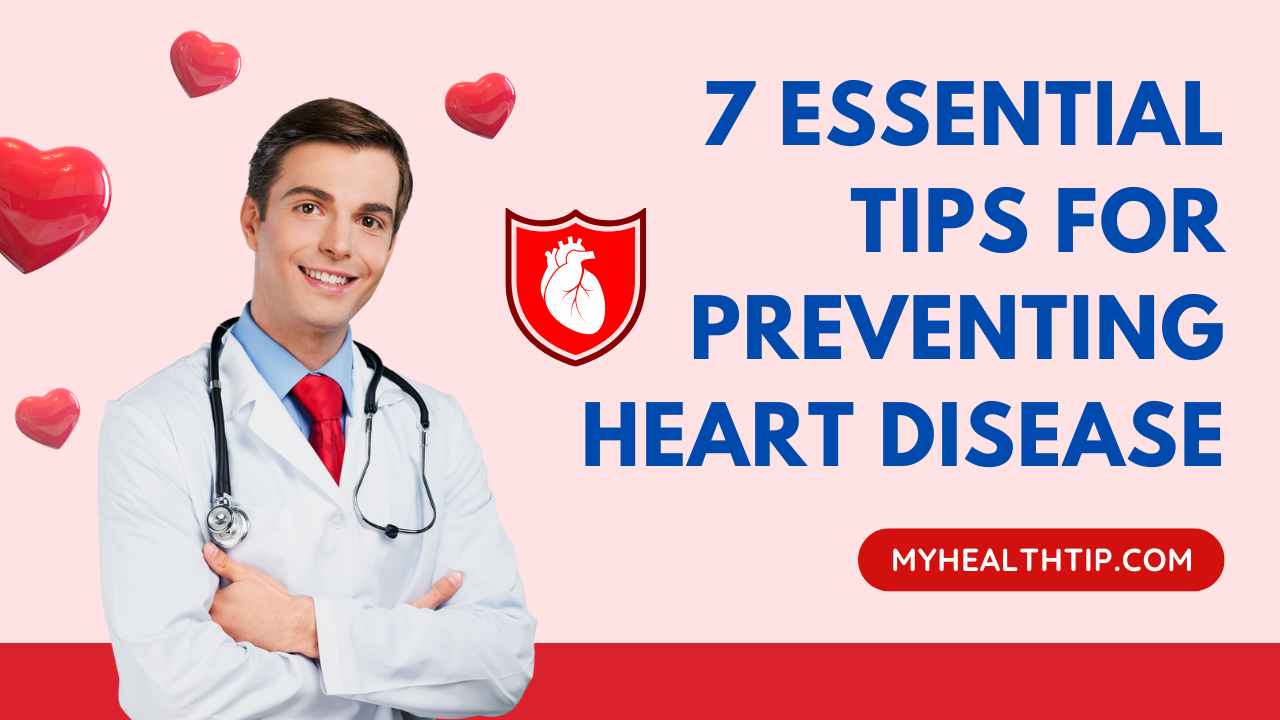Table of Contents
7 Essential Tips for Preventing Heart Disease
Heart disease remains a leading cause of death worldwide, but the good news is that many of its risk factors are preventable. By adopting a healthier lifestyle and making informed choices, you can significantly reduce your chances of developing heart disease. Here are seven essential tips for preventing heart disease.
1. Maintain a Healthy Diet
A nutritious diet is fundamental to preventing heart disease. Eating the right foods helps maintain a healthy weight, lower cholesterol levels, and reduce blood pressure.

Focus on Whole Foods
Eating a variety of whole foods ensures you get essential nutrients without the added sugars and unhealthy fats found in processed foods. Prioritize fruits, vegetables, whole grains, and lean proteins.
Reduce Saturated and Trans Fats
These fats increase bad cholesterol levels, which can lead to heart disease. Limit intake of red meat, full-fat dairy products, and processed foods. Opt for healthier fats like those found in olive oil, avocados, and nuts.
Increase Omega-3 Fatty Acids
Omega-3 fatty acids, found in fatty fish like salmon and flaxseeds, are known for their heart-protective benefits. Including them in your diet can help lower the risk of heart disease.
2. Exercise Regularly
Regular physical activity is crucial for preventing heart disease. Exercise helps control weight, lower blood pressure, reduce cholesterol, and improve overall cardiovascular health.
Aim for 150 Minutes of Moderate Exercise Weekly
The American Heart Association recommends at least 150 minutes of moderate-intensity exercise per week. This can include activities like brisk walking, cycling, or swimming.
Incorporate Strength Training
In addition to aerobic exercises, include strength training exercises at least twice a week. Building muscle helps improve metabolism and maintain a healthy weight.
Stay Active Throughout the Day
Even if you exercise regularly, it’s important to stay active throughout the day. Avoid prolonged periods of sitting by taking short breaks to stand, walk, or stretch.
3. Avoid Smoking and Limit Alcohol Consumption
Smoking is a major risk factor for heart disease. The chemicals in tobacco damage the heart and blood vessels, leading to atherosclerosis. Additionally, excessive alcohol consumption can lead to high blood pressure and other heart-related issues.
Quit Smoking
If you smoke, quitting is one of the best steps you can take to improve your heart health. Seek support from healthcare providers, support groups, or smoking cessation programs.
Limit Alcohol Intake
Moderate alcohol consumption is defined as up to one drink per day for women and up to two drinks per day for men. Excessive drinking can lead to hypertension and increase the risk of heart disease.
4. Manage Stress
Chronic stress contributes to heart disease by raising blood pressure and cholesterol levels and promoting unhealthy behaviors such as poor diet and smoking.
Practice Relaxation Techniques
Incorporate relaxation techniques such as deep breathing, meditation, and yoga into your daily routine. These practices help reduce stress and improve heart health.
Maintain a Healthy Work-Life Balance
Strive for a balance between work and personal life. Make time for hobbies, social activities, and relaxation to reduce stress levels.

Seek Professional Help if Needed
If you find it difficult to manage stress on your own, consider seeking help from a mental health professional. Therapy or counseling can provide strategies to cope with stress more effectively.
5. Monitor Your Health Regularly
Regular health check-ups are essential for preventing heart disease. Monitoring your blood pressure, cholesterol levels, and blood sugar can help detect potential problems early.
Know Your Numbers
Understanding your health metrics, such as blood pressure, cholesterol levels, and body mass index (BMI), helps you make informed decisions about your health.
Follow Your Doctor’s Recommendations
If you have risk factors for heart disease, your doctor may recommend lifestyle changes or medications to manage them. Follow these recommendations closely to reduce your risk.
Stay Informed
Keep up-to-date with the latest information on heart health. Understanding the risks and prevention strategies can empower you to make healthier choices.
6. Maintain a Healthy Weight
Being overweight or obese increases the risk of heart disease. Excess weight can lead to high blood pressure, high cholesterol, and diabetes, all of which are risk factors for heart disease.
Adopt Healthy Eating Habits
Focus on eating a balanced diet with appropriate portion sizes. Avoid crash diets or fad diets that promise quick results but are unsustainable in the long term.
Exercise Regularly
Combine a healthy diet with regular exercise to maintain a healthy weight. Physical activity helps burn calories and build muscle, contributing to weight management.
Set Realistic Goals
Set achievable weight loss goals and work towards them gradually. Even a modest weight loss can have significant health benefits.
7. Get Enough Sleep
Quality sleep is crucial for heart health. Poor sleep can contribute to high blood pressure, obesity, and diabetes, all of which increase the risk of heart disease.

Aim for 7-9 Hours of Sleep Per Night
Most adults need between 7-9 hours of sleep each night. Establish a regular sleep schedule to ensure you get enough rest.
Create a Sleep-Friendly Environment
Ensure your bedroom is conducive to sleep by keeping it dark, quiet, and cool. Avoid using electronic devices before bedtime, as the blue light can interfere with sleep.
Practice Good Sleep Hygiene
Adopt habits that promote better sleep, such as avoiding caffeine and large meals before bedtime, and establishing a relaxing bedtime routine.
Conclusion
Preventing heart disease involves making conscious choices about your lifestyle and health. By maintaining a healthy diet, exercising regularly, avoiding smoking, managing stress, monitoring your health, maintaining a healthy weight, and getting enough sleep, you can significantly reduce your risk of heart disease. Remember, preventing heart disease is an ongoing process that requires commitment and consistency. Start incorporating these tips into your daily routine today to protect your heart and improve your overall health.





